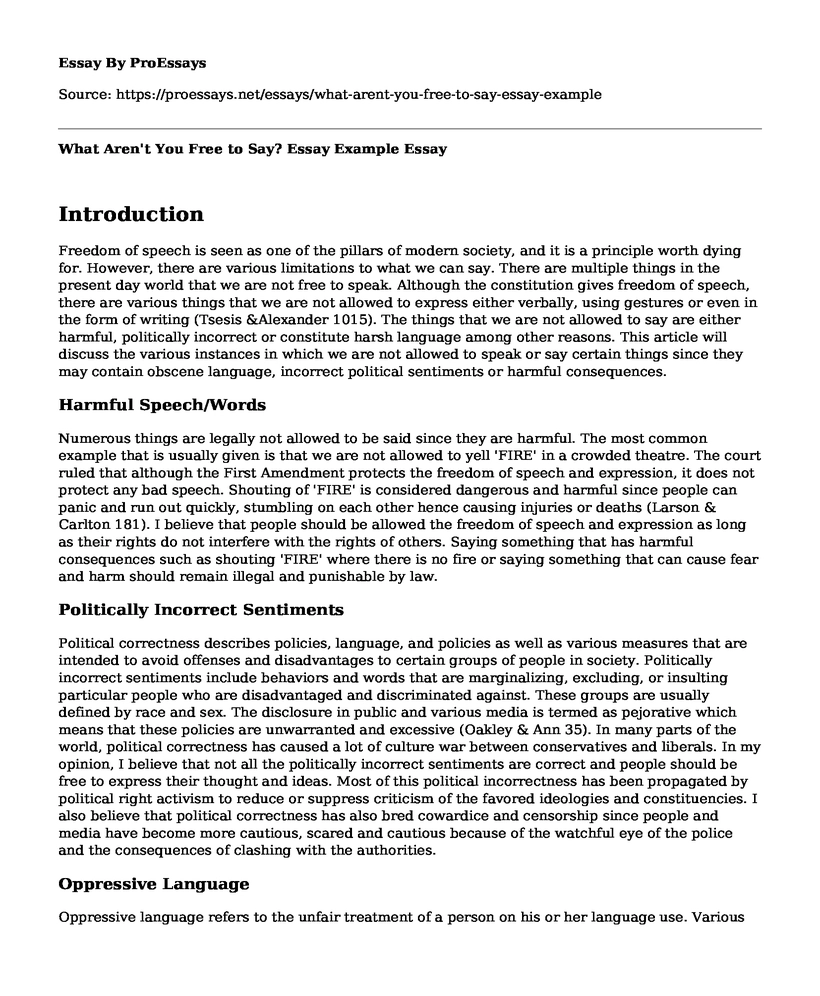Introduction
Freedom of speech is seen as one of the pillars of modern society, and it is a principle worth dying for. However, there are various limitations to what we can say. There are multiple things in the present day world that we are not free to speak. Although the constitution gives freedom of speech, there are various things that we are not allowed to express either verbally, using gestures or even in the form of writing (Tsesis &Alexander 1015). The things that we are not allowed to say are either harmful, politically incorrect or constitute harsh language among other reasons. This article will discuss the various instances in which we are not allowed to speak or say certain things since they may contain obscene language, incorrect political sentiments or harmful consequences.
Harmful Speech/Words
Numerous things are legally not allowed to be said since they are harmful. The most common example that is usually given is that we are not allowed to yell 'FIRE' in a crowded theatre. The court ruled that although the First Amendment protects the freedom of speech and expression, it does not protect any bad speech. Shouting of 'FIRE' is considered dangerous and harmful since people can panic and run out quickly, stumbling on each other hence causing injuries or deaths (Larson & Carlton 181). I believe that people should be allowed the freedom of speech and expression as long as their rights do not interfere with the rights of others. Saying something that has harmful consequences such as shouting 'FIRE' where there is no fire or saying something that can cause fear and harm should remain illegal and punishable by law.
Politically Incorrect Sentiments
Political correctness describes policies, language, and policies as well as various measures that are intended to avoid offenses and disadvantages to certain groups of people in society. Politically incorrect sentiments include behaviors and words that are marginalizing, excluding, or insulting particular people who are disadvantaged and discriminated against. These groups are usually defined by race and sex. The disclosure in public and various media is termed as pejorative which means that these policies are unwarranted and excessive (Oakley & Ann 35). In many parts of the world, political correctness has caused a lot of culture war between conservatives and liberals. In my opinion, I believe that not all the politically incorrect sentiments are correct and people should be free to express their thought and ideas. Most of this political incorrectness has been propagated by political right activism to reduce or suppress criticism of the favored ideologies and constituencies. I also believe that political correctness has also bred cowardice and censorship since people and media have become more cautious, scared and cautious because of the watchful eye of the police and the consequences of clashing with the authorities.
Oppressive Language
Oppressive language refers to the unfair treatment of a person on his or her language use. Various laws and regulations warn against the use of the harsh word on individuals. The purpose of language that brings all this commotion includes the individual's language that provides for various character traits of the speech of an individual like accent and the size of vocabulary, syntax, and modality (Cocker, Christine & Trish 334). The other component involves the capabilities of one to use or not use a specific language. Based on the language difference, people can automatically form judgments on the other person's social status, wealth and education among other character traits. The perceived understandings can ultimately lead to unfair treatment of the individual. According to my opinion, people should not undergo oppressive language incidents as each person has the right to express themselves in the best way they can despite the limitations.
Conclusion
The constitution champions for the freedom of expression and the right of free speech. However, these rights should be enjoyed as long as one does not violate the rights of other people. People are therefore not allowed to say certain things such as those that can cause harm, those that are politically incorrect or constitute harsh language. Therefore, people should be allowed to voice their opinions and ideas without violating the rights of others.
Works Cited
Cocker, Christine, and Trish Hafford-Letchfield, eds. Rethinking Anti-Discriminatory And Anti-Oppressive Theories For Social Work Practice. Palgrave Macmillan, 2014. 334
Larson, Carlton FW. "Shouting Fire in a Theater: The Life and Ties of Constitutional Law's Most Enduring Analogy." Wm. & Mary Bill Rts. J. 24 (2015): 181.
Oakley, Ann. Sex, Gender and Society. Routledge, 2016. 35
Tsesis, Alexander. "Free Speech Constitutionalism." U. Ill. L. Rev. (2015): 1015.
Cite this page
What Aren't You Free to Say? Essay Example. (2022, Dec 04). Retrieved from https://proessays.net/essays/what-arent-you-free-to-say-essay-example
If you are the original author of this essay and no longer wish to have it published on the ProEssays website, please click below to request its removal:
- The State of Confusion v. William K Defendant Case Study
- Literary Analysis Essay on Crime and Mental Illness
- Essay Sample on The Power of Communication: Verbal and Non-Verbal
- Essay Example on Conservatism: Ideology Behind Preserving Human & Social Rights
- Paper Example on Young Man's Curiosity Leads to Compromise in Modern Times
- Book Review Example on The Hot House Life Inside Leavenworth Prison
- Essential Soft Skills for Workplace Success: A Comprehensive Evaluation







